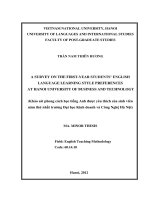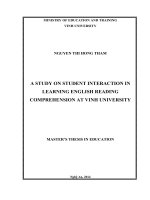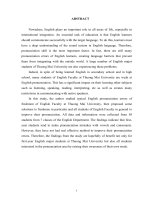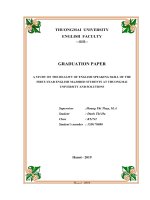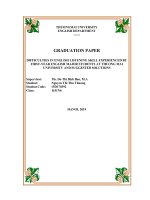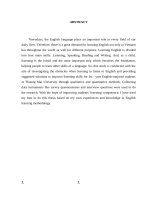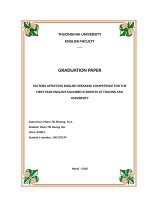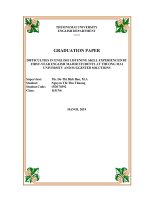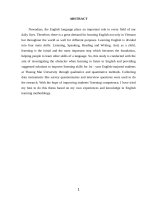A study on the reality of learning english speaking skill of the first year english majored students at thuong mai university and solutions
Bạn đang xem bản rút gọn của tài liệu. Xem và tải ngay bản đầy đủ của tài liệu tại đây (505.77 KB, 49 trang )
THUONGMAI UNIVERSITY
ENGLISH FACULTY
------
GRADUATION PAPER
A STUDY ON THE REALITY OF ENGLISH SPEAKING SKILL OF THE
FIRST-YEAR ENGLISH MAJORED STUDENTS AT THUONGMAI
UNIVERSITY AND SOLUTIONS
Supervisor
:Hoang Thi Thuy, M.A
Student
: Danh Thi Ha
Class
: K51N2
Student’s number : 15D170080
Hanoi - 2019
Hanoi - 2018
ABSTRACT
The study is aimed at finding out the reality of learning English speaking skill of
the first-year English majored students at ThuongMai University and giving some
effective solutions to deal with this reality. For the objectives, 50 first-year English
HÀ NỘI - 2016
majored students were invited to participate in this study. They were asked to do a
survey questionnaire and personal interview question which help to identify the reality
of learning English speaking skill. The results of the study revealed that students faced
up with some problems when learning English speaking skill such as:
mispronunciation, limited listening skill, limited amount of vocabulary, the habit of
translating from Vietnamese into English as well as lack of background knowledge and
confidence when speaking English. In addition, some suggestions were proposed to
help students solve these problems and enhance their English speaking skill.
i
ACKNOWLEDGEMENTS
First and foremost, I would like to express my sincerely thanks to my supervisor,
Ms. Hoang Thi Thuy, for her great help, guidance, tireless support and encouragement
during my study. Furthermore, I would highly appreciate all her helps and instructions
on various drafts of the study. Without her enthusiastic help and support, I couldn’t be
able to complete this study on schedule.
I would also like to express my appreciation to all teachers at Faculty of English
at Thuong Mai University, those who helped me so much in my data collection. My
sincerely thanks also go to 50 first-year English majored students of the English
Faculty who actively participate in the survey questionnaire and interviews.
Additionally, I would like to show my deepest thanks to my dear friends for their
great help and encouragement through my hard times carrying out the thesis.
Especially, I am indebted to my loving parents for their continuous
encouragement and support during my study. Thanks to their devotion, I have
overcome the difficult times and completed this paper.
Ha Noi, 19th APR 2019
Ha
Danh Thi Ha
ii
TABLE OF CONTENT
ABSTRACT..................................................................................................................i
ACKNOWLEDGEMENTS........................................................................................ii
TABLE OF CONTENT..............................................................................................iii
LIST OF TABLES AND CHARTS.............................................................................v
CHAPTER 1: OVERVIEW OF THE STUDY..........................................................1
1.1 Rationale................................................................................................................1
1.2 Previous studies......................................................................................................2
1.3 Aims of the study....................................................................................................3
1.4 Scope of the study.................................................................................................3
1.5 Research methodology..........................................................................................4
1.6 Organization of the study.....................................................................................7
CHAPTER 2: LITERATURE REVIEW...................................................................8
2.1 Definitions of speaking skill..................................................................................8
2.1.1 The concepts of skill.............................................................................................8
2.1.2 The definition of speaking skill...........................................................................8
2.2 Types of speaking.................................................................................................10
2.3 Speaking process..................................................................................................11
2.4 Purposes of speaking............................................................................................12
2.5 The importance of speaking skill.......................................................................14
2.6 Problems in speaking English.............................................................................15
2.6.1 Outer impacts.....................................................................................................15
2.6.2 Nothing to say....................................................................................................16
2.6.3 Low in participant.............................................................................................16
2.6.4 Mother-tongue use............................................................................................16
2.7 Factors influencing student’s English speaking skill........................................17
2.7.1 Lack of motivation.............................................................................................17
2.7.2 Listening comprehension..................................................................................18
2.7.3 Vocabulary.........................................................................................................19
2.7.4 Grammar...........................................................................................................19
2.7.5 Pronunciation...................................................................................................20
iii
2.8 Strategies in speaking English effectively..........................................................21
2.8.1 Learning English strategies...............................................................................21
2.8.2 Strategies to improve English speaking skill.....................................................22
CHAPTER 3: RESEARCH FINDINGS..................................................................24
3.1 Data analysis........................................................................................................24
3.1.1 Results from the questionnaire..........................................................................24
3.1.2 Results from personal interview........................................................................32
3.2 Some discussion on the reality of learning English speaking skill of the firstyear English majored students..................................................................................33
CHAPTER 4: RECOMMENDATIONS AND SUGGESTIONS............................35
4.1 Recommendations and suggestions to improve English speaking skill for the
first-year English majored students at TMU...........................................................35
4.1.1 Practicing listening skill....................................................................................35
4.1.2 Improving vocabulary........................................................................................35
4.1.3 Practicing speaking English with foreigners and friends.................................36
4.2 Recommendations and suggestions for teachers to help students improve their
English speaking skill................................................................................................36
4.2.1. Understanding students’ feeling.......................................................................36
4.2.2 Finding the effective teaching methods.............................................................36
4.2.3 Setting an English speaking environment.........................................................37
4.3 Recommendations and suggestions for Thuong Mai University to help
students improve their English speaking skill.........................................................37
4.3.1 Directing the Faculty of English to employ foreign native teachers................37
4.3.2 Using high-tech equipments in the classroom...................................................37
4.3.3 Holding more English speaking contest and language seminars.....................37
4.4. Some suggestions for further studies................................................................38
4.4.1 Limitations of the study......................................................................................38
4.4.2 Some suggestions for further studies................................................................38
CONCLUSION..........................................................................................................39
REFERENCES
APPENDIX
iv
LIST OF TABLES AND CHARTS
No.
1
2
3
4
Charts and tables
Chart 1.1: Distribution of the student participants
Chart 3.1: Students’ purposes to learn English speaking skill
Chart 3.2: Students’ participation in speaking class
Chart 3.3: Students’ difficulties and problems faced in speaking
Page
5
27
29
30
5
English
Chart 3.4: Students’ solutions to overcome and improve their English
31
6
7
8
9
10
speaking skill
Table 3.1: Students’ English learning background
Table 3.2: Students’ attitudes towards leaning English speaking skill
Table 3.3: Students’ evaluation their level of speaking English
Table 3.4: Students’ frequency in practicing English speaking skill
Table 3.5: Students’ feeling in speaking English
24
25
26
28
28
v
CHAPTER 1: OVERVIEW OF THE STUDY
1.1 Rationale
In recent times, it is undeniable that language is a pivotal part of our society’s
cultural richness in particular and of the world in general. In order to keep ourselves
keep up with the global standard in today’s world which is called international
community, we need to have knowledge and understanding of English as an
international language. English language is the dominant business language, and it has
become almost the necessity for people to speak English. It is the key to unlock the
door which helps us to explore new world, new culture and broaden the mind about the
big world.
Speaking is one of the basic language skills that need to be proficient by English
foreigner learners due to its significance and its use for communication. It is very
important to be able to speak English because it is the most commonly accepted
language in the global world so that it will be very beneficial for those who
comprehend it not only to improve their background knowledge but also to help them
get a good job. By speaking English fluently, they will not find difficult to
communicate and interact with people around the world when they travel.
Moreover, nowadays, Vietnam becomes one of the members of the World Trade
Organization, it is crucial for Vietnamese students of English to have good English
speaking skill in order to adapt to the increasing demand of integration into the world
economy and exchange culture with other countries. As a result, learning English
speaking skill is a great advantage for Vietnamese students. However, it is not easy for
student to fluent because of some influences on the different cultures, mother tongue
or their own limited language ability, and so on…
In the context of Thuong Mai University, learning English speaking is one of the
compulsory subjects at Faculty of English. However, most of students do not have
good marks in this course. In addition, from the observations during English speaking
course, the researcher found out that the student faced with many problems and
difficulties in learning English speaking skill. To improve teaching and learning
English speaking skill for the first-year English majored students at Faculty of English,
Thuong Mai University, it is vital to find out the reality of learning English speaking
skill as well as the solutions to deal with this problem.
1
For those reasons, “A study on the reality of learning English speaking skill of
the first-year English majored students at Thuong Mai University and solutions”
was conducted to identify the reality of learning English speaking skill and propose
solutions to help them improve their English speaking skill.
1.2 Previous studies
There has previously been many studies done relating to this area which will be
listed as follows:
Firstly, a study on how to improve English language speaking skills of Ajloun
National University Students was conducted by Abdel- Rahman Al- Eiadeh, B.A
Student, department of English language and literature at Ajloun National University.
For the objectives, 20 students consist of 12 Females student and 8 Males students
were invited to do this research. All of them are studying English language, the
majority of the objectives were the Seniors and Juniors students, while Freshman were
minority students. This thesis focused on analyzing and revealing the problems ANU
students had to face related to speaking skill such as confusion and embarrassment;
students lack of confident and background knowledge and face difficulty in
pronouncing some words. And the study presented some of solutions to improve
English speaking skills such as practicing English outside and inside the classroom
effectively, using the modern social media to help student communicate in English and
to express the student feeling and demand.
Secondly, an action research project on the understanding and actions taken to
improve speaking skill through game in a public school called “Federico Garcia
Lorca” in Columbia accomplished by Urrutia & Vega (2006). The participants in this
study were twenty girls and twenty boys from 14 to 18 years old. The data collection
instruments were used in this study are questionnaires, teacher’s journals and video
recordings. The results of the study revealed that majority of students considered that
speaking English is the most complicated skill to work out; the researcher noticed that
students sometimes spoke English but the majority of them did not speak English
during the English class.
In addition, other study on how to improve English speaking skill through extraactivities for the first-year English non-major students in Hai Phong Private University
2
conducted by Nguyen Thi Dieu Huyen(2008). The study identified the reality of
teaching and learning English at Hai Phong Private University, covered the
background knowledge of speaking. The research also proposed some appropriate
methods for teaching speaking lesson which draw student’s attention into the lesson.
Besides, Hamzad & Ting (2009) conducted a qualitative and action research
study on success of using group work in teaching speaking in English classroom in a
school called “SMK Damai Jaya” in Malaysia. The sample of the study was 33
students and 3 English teachers. Questionnaires, observations and interviews were
used as data collection instruments. The researchers carried out a series of
questionnaires in Malay language which helped students provide their opinions about
the group work activities to improve speech skills and their consciousness of
participation in those activities. The results of the study expressed enthusiasm in group
work activities and proficiency in spoken language.
To sum up, obviously these studies have been researched on different criteria of
the language learning. However, this research study will look into the reality of
learning English speaking skill of the first-year English majored students at
Thuongmai University and solutions
1.3 Aims of the study
The primary aim of this research is to find out the reality of learning English
speaking skill of the first-year English majored students at Thuong Mai University.
The study also aims to find out problems students faced when speaking English and
then some solutions will be suggested to help students overcome the problems and
improve their English speaking skill.
The targeted subjects of this study are mainly students; however, all people who
are interested in learning English speaking skill can consider it as a useful reference
for enhancing their English speaking skill as well.
1.4 Scope of the study
When the first-year students in Faculty of English, Thuong Mai University
(2018-2022 curriculum) start to their semester, English speaking course is the
compulsory subject for them. This paper focuses on researching and analyzing the
reality of learning English speaking skill by using the data collected from giving the
3
first-year students in Faculty of English, TMU make a questionnaire and personal
interview as well as making some suggestions to help students improve their English
speaking skill. The results of the study are limited to the students participate in this
study. But it can be a source for anyone who excited and want to practice and enhance
speaking English.
1.5 Research methodology
1.5.1 Research design
It took about 2 months to carry out this study. Firstly, the researcher chose the
topic, collected the related previous studies and information through the internet,
reference books and other sources which is useful and support for the researcher
during the research. After that, the questionnaire and personal interview related to the
thesis were designed and taken by 50 first-year English majored students at TMU.
Finally, the study was fulfilled to find out the reality of learning English speaking skill
by the first–year students at Faculty of English, the problems and some solutions were
given as well.
1.5.2 Research questions
In order to identify the reality of learning English speaking skill of the first-year
English majored students at Faculty of English, Thuong Mai University, this study
concentrate on answering the following question:
1. What is the importance of the English speaking skill?
2. What strategies can be helpful for students to speak English well?
3.
What is the reality of the first-year English majored student’s English
speaking skill?
4. How can students improve their English speaking skill?
1.5.3 Participations of the study
There were 50 randomly first-year students in Faculty of English selected to take
part in the study. They all were learning English speaking skill. Among them, there
were 10 males and 40 females. The information of the students who participate in this
study was shown in the chart 1.1 below.
4
Chart 1.1 Distribution of the student participant
1.5.4 Methods of the study
A variety of methods were considered and selected to fulfill this research as the
following:
-
Reference materials including reference books, reference previous studies
were carefully chosen, researched and analyzed.
- A survey questionnaire and personal question interview was conducted by
the first-year students at Faculty of English to collect information for this thesis.
1.5.5 Instruments
The researcher was about to collect data on the reality of learning English
speaking skill of the first-year students at Faculty of English (Thuong Mai University)
through the questionnaire and personal interviews with the expect to guarantee the
reliability of this study.
1.5.5.1 The survey questionnaire
The survey questionnaire was contributed to 50 first-year English majored
students at Thuong Mai University. The questionnaire in this study can help to find out
the necessary data and information for this research.
In this study, the survey questionnaire was included 11 questions are closed,
multiple choices and open-ended questions with the following purposes:
5
Investigating and getting information about the student’s difficulties and
problems in learning English speaking skill
Knowing the student’s frequency in using English to speak and their level
Know the ways students used to improve their English speaking skill
1.5.5.2 Personal interview
The interview was conducted with a group of students who were chosen from the
participants. The questions in the interview were open-ended questions to get and
gather information about the student’s opinions on improving their English speaking
skill as well as some difficulties students faced when learning English speaking skill of
the first-year students at Faculty of English (TMU). In addition, a personal interview
provided an opportunity for the researcher and participants to share their own ideas
about learning English speaking skill.
1.5.6 Data collection procedures
There are several methods of data collection. In this research, there were
specifically two steps used to collect data in this study. The first step was collecting
data from the survey questionnaire. And the second ones was collecting data from the
personal interview.
1.5.6.1 Procedures for conducting the questionnaire.
The questionnaire was designed on Google form and sent the link for the
participants to fill out its. At the same time, lots of copies of the questionnaire were
printed and delivered to participants. When the survey questionnaire was completed,
the researcher gathered and analyzed them.
1.5.6.2 Procedures for conducting the personal interview.
The interviews were conducted randomly with some students. The researcher
will ask the interviewees and take note the primary information which are necessary
for the study.
1.5.7 Data analysis procedures
The researcher collected data from two different sources and analyzed it in two
main parts as follows:
1) The student’s perception on the importance of learning English speaking skill
2) Solutions to improve student’s English speaking skill of the first-year English
majored students at TMU.
6
The data through survey questionnaire will be presented and analyzed in the
forms of charts. While, the other one from opened-ended questionnaires and personal
interviews were presented by quoting relevant responses. Finally, the data were
analyzed both descriptively and interpretively.
1.6 Organization of the study
This research was organized into four main chapter:
Chapter 1: Overview of the study: this chapter provides a general overview of
the study. It includes the rationale, aims of the study and some previous studies related
to the current research. Later, there are research questions, scope of the study and
research methodology. And the last is organization of the study
Chapter 2: Literature review, this part lays the foundation for the research. This
chapter reviews the terms and concepts related to speaking skill, the importance of
speaking skill, problems in learning English speaking as well as some factors influencing
student’s speaking skill. And the last is some strategies to improve English speaking skill.
Chapter 3: Research findings, it presents the results of the study, discussion of
the results and summary of major findings.
Chapter 4: Recommendations and suggestions, in this chapter, some
recommendations are suggested to help students improve their English speaking skill
along with some recommendations for further study.
CHAPTER 2: LITERATURE REVIEW
This chapter will review some theories related to the subject matter of this study.
The literature review is organized in four part. It firstly introduces concepts of skill
7
and speaking, types of speaking, the speaking process as well as the purpose of
speaking. It also reviews the importance of speaking skill and presents some problems
student faced when learning English speaking skill. Then, some related factors
influencing student’s English speaking will be addressed.
2.1 Definitions of speaking skill
2.1.1 The concepts of skill
There are many definitions of skill as well as speaking. As business dictionary,
“skill” is an ability and capacity acquired through deliberate, systematic, and sustained
effort to smoothly and adaptively carrying out complex activities or job functions
involving ideas (cognitive skills), things (technical skills), and/or people (interpersonal
skills), also see competence. In Collins dictionary, if skill is countable noun, it is
considered as a type of work or activity which requires special training and
knowledge. In contrast, if it is uncountable noun, skill is the knowledge and ability that
enables you to do something well. Skill is developed though practice, through a
combination of sensory input and output.
Skill is usually understood as an ability to do something well, either manually,
mentally, or both. In contrast to terms that denote only potential for acquiring some
abilities (such as natural ability, talent, aptitude, or capacity), the term skill usually
means actual competence that has been acquired by training, schooling, or practice.
The concept used in several disciplines (most importantly economics, sociology,
psychology, education, and ergonomics), has many meanings, and is applied for
different purposes and in a variety of contexts. The term skill is mainly used to refer to
(1) a level of individual performance, in the sense of accuracy and speed in performing
particularly tasks, or (2) qualities required for successful performance in particular
jobs and tasks.
2.1.2 The definition of speaking skill
There is a variety of definitions of speaking as noted, speaking is defined as the
delivery of language through the mouth. To speak, we create sounds using many parts
of our body, including the lungs, vocal tracts, vocal cords, tongue, teeth and lips.
According to Widdowson (1994), speaking is considered the most important
active skill for a foreign language learning. Rodriques (2000:32) stated that speaking is
8
the producing utterances for communicating messages. It starts from infancy to be
developed during childhood to maturity (Levelt,1989: 2) whereas Abdel Salam (2002)
showed that speaking identified as a collection of micro-skills which include syntax,
grammar, morphology, pragmatics or social language, semantics and phonology.
According to Burns & Joyce (1997), speaking is defined as an interactive process
of constructing meaning that involves producing, receiving and processing
information. Its form and meaning depend on the context in which it occurs, the
participants and the purposes of speaking. Therefore, speaking skill isn't only
producing the utterances, but it is the complete process of constructing meanings, 38
producing utterances and receiving and processing information (Brown, 1994) with
confidence (Bygate,1987).
Speaking is of great importance in second language learning. Because its
importance, speaking has been overlooked in schools and universities because of
different reasons like emphasis on grammar and unfavorable teacher-student
proportions. Speaking has been absent from testing because of the problem in
assessing it objectively and the time it takes to carry out speaking tests (Clifford,
1987). Speaking is a skill which is worth of attention in both first and second
language. Learning the speaking skill is the most important aspect of learning a second
or foreign language and success is measured basing on the ability to perform a
conversation in the language (Nunan, 1995).
In Webster New World Dictionary, speaking is to say words orally, to
communicate as by talking, to make a request, and to make a speech (Nunan, 1995).
According to Chaney (1998), speaking is the process of making and sharing meaning
by using verbal and non-verbal symbols in different contexts. Bygate (1987) defined
speaking as the production of auditory signals to produce different verbal responses in
listeners. It is regarded as combining sounds systematically to form meaningful
sentences. Eckard and Kearny (1981), Florez (1999), Howarth (2001), and Abd El
Fattah Torky (2006) defined speaking as a two–way process including a true
communication of opinions, information, or emotions. This top-down view regards the
spoken texts as the collaboration between two or more persons in the shared time and
the shared context.
9
Speaking is one of the four language skills (reading, writing, listening and
speaking). It is the means through which learners can communicate with others to
achieve certain goals or to express their opinions, intentions, hopes and viewpoints. In
addition, people who know a language are referred to as ‘speakers’ of that language.
Furthermore, in almost any setting, speaking is the most frequently used language
skill. As Rivers (1981) argues, speaking is used twice as much as reading and writing
in our communication. It has been classified to monologue and dialogue. The former
focuses on giving an interrupted oral presentation and the latter on interacting with
other speakers (Nunan,1989: 27). Speaking can also serve one of two main functions:
transactional (transfer of information) and interactional (maintenance of social
relationships) (Brown and Yule, 1983: 3)
2.2 Types of speaking
Speaking is the productive skill in the oral mode. It, like the other skill, is more
complicated than it seems at first and involves more than just pronouncing words.
There are three kinds of speaking situations in which we find ourselves:
Interactive
Interactive speaking includes face-to-face conversations and telephone calls, in
which we alternatively listening and speaking, and in which we have a chance to ask
for clarification, repetition, or slower speech from our conversation partner.
Partially interactive
Some speaking situations are partially interactive, for example giving a speech to
a live audience where the convention is that the audience does not interrupt the speech.
The speaker nevertheless can see the audience and judge from the expression on their
faces and body languages whether or not he or she is being understood.
Non-interactive
Some few speaking situations may be totally non-interactive, such as when
recording a speech for a radio broadcast, performing in a play, reciting a poem or singing.
2.3 Speaking process.
Through observations and study, we have seen that the speaking process involves
multiple stages. At each stage, there is a potential for barriers to be formed or problems
to arise. Konar (2011:161) identified activities involving in the speaking process as
follows:
- The sender tried to convey an idea by encoding it into a message
10
- The message travels through a channel from the sender to receiver
- The receiver decodes the message
- The receivers prove the feedback
- The process gives the frame of reference of the sender and the receiver.
- The process provides the context of the receiver.
Some experts pointed out four different stages of speaking as follows:
- Ideation: it is the stage of forming the idea or selecting the messages which can
be either logical or emotional. Such classification of messages constitutes later “what”
to communicate (Rizvi, 2005: 5).
- Encoding: this is the stage by which the sender converts the idea into a message
using the verbal and non-verbal means of communication (Konar, 2011: 161) in the
shape of spoken words, gestures, symbols, signs or body movements (Shafaei, 2011: 510)
by choosing the appropriate channel of communication (Guffey & Loewy, 2010: 15).
Many filters are used when sending and receiving the message; the socio-economiccultural background for the communicators, their opinions, beliefs, and feelings (Konar,
2011: 161). During this stage, communication also involves the proper timing, place and
manner of sending and receiving (DuBoff & Krages, 2005: 10).
- Decoding: it involves the translation or conversion of the received stimulus into
thoughts so that one can understand the message (Talloo, 2008: 154).
- Response: it involves the action or reaction which shows that the receiver has
understood the message (Leonard, 2012: 85). It also helps the sender to know that the
message was successfully transmitted in what is called feedback.
11
2.4 Purposes of speaking
It was argued that the purpose of speaking can be either transactional or
interactional. Apparently, there are some differences among the spoken languages used
in both transactional and interactional discourse.
In transactional discourse, language is used primarily for communicating
information. Language supporting this purpose is 'message' oriented rather than
'listener' oriented (Nunan, 1989: 27). Clearly, in this type of interaction, accurate and
coherent communication of the message is important. Examples of language being
used primarily for a transactional purpose are: news broadcasts, descriptions,
narrations and instructions (Richards, 1990: 54- 55)
On the other hand, some conversations are interactional with the purpose of
establishing or maintaining a relationship. It plays an importantly social role in oiling
the wheels of social intercourse (Yule, 1989: 169). Greetings, small talks, and
compliments are considered as examples of interactional. Apparently, the language
used in the interactional mode is listener oriented. Speakers' talk in this type tends to
be limited to quite short turns (Dornyei & Thurrell, 1994: 43 and Richards, 1990: 5455).
Analyzing speaking purposes more precisely, Kingen (2000: 218) combines both
the transactional and interpersonal purposes of speaking into an extensive list of
twelve categories as follows:
- Personal - expressing personal feelings, opinions, beliefs and ideas.
- Descriptive- describing someone or something, real or imagined.
- Narrative- creating and telling stories or chronologically sequenced events
- Instructive- giving instructions or providing directions designed to produce an
outcome.
- Questioning- asking questions to obtain information.
- Comparative- comparing two or more objects, people, ideas, or opinions to
make judgments about them.
- Imaginative- expressing mental images of people, places, events, and objects.
- Predictive- predicting possible future events.
- Interpretative- exploring meanings, creating hypothetical deductions, and
considering inferences.
- Persuasive- changing others’ opinion, attitudes, or points of view, or influencing
the behavior of others in some way.
- Explanatory- explaining, clarifying, and supporting ideas and opinions.
12
- Informative-sharing information with others
Aristotle talked about three speech purposes: deliberative (political speech),
forensic (courtroom speech), and epideictic (speech of praise or blame). Cicero also
talked about three purposes: judicial (courtroom speech), deliberative (political
speech), and demonstrative (ceremonial speech—similar to Aristotle’s epideictic) St.
Augustine of Hippo also wrote about three specific speech purposes: to teach (provide
people with information), to delight (entertain people or show people false ideas), and
to sway (persuade people to a religious ideology). All these systems of identifying
public speeches have been attempts at helping people determine the general purpose of
their speech. A general purpose refers to the broad goal in creating and delivering a
speech.
These typologies or classification systems of public speeches serve to
demonstrate that general speech purposes have remained pretty consistent throughout
the history of public speaking. Modern public speaking scholars typically use a
classification system of three general purposes: to inform, to persuade, and to entertain
To inform
The first general purpose that some people have for giving speeches is to inform.
Simply, this is about helping audience members acquire information that they do not
already possess. Audience can then use this information to understand something (e.g.,
speech on a new technology, speech on a new virus) or to perform a new task or
improve their skills (e.g., how to swing a golf club, how to assemble a layer cake). The
most important characteristic of informative topics is that the goal is to gain
knowledge. Notice that the goal is not to encourage people to use that knowledge in
any specific way.
To persuade
The second general purpose people can have for speaking is to persuade. That is
the ability to attempt to get listeners to embrace a point of view or to adopt a behavior
that they would not have done otherwise. A persuasive speech can be distinguished
from an informative speech by the fact that it includes a call for action for the audience
to make some change in their behavior or thinking.
To entertain
13
Entertaining speeches are very common in everyday life. The fundamental goal
of an entertaining speech is audience enjoyment, which can come in a variety of forms.
Entertaining speeches can be funny or serious. Entertaining speeches are not designed
to give an audience a deep understanding of life but instead to function as a way to
divert an audience from their day-to-day lives for a short period of time. This is not to
say that an entertaining speech cannot have real content that is highly informative or
persuasive, but its goal is primary about the entertaining aspects of the speech and not
focused on the informative or persuasive quality of the speech.
2.5 The importance of speaking skill
Speakers can't produce effective and appropriate outcomes until they have been
exposed to some specific linguistic competences such as grammar, pronunciation and
vocabulary, as well as the sociolinguistic competence such as register of the
expressions and the contextualizing of the language. Teachers were used to focusing
on teaching grammar and vocabulary in isolation which made it difficult if not
impossible for teachers and assessors to evaluate language use ability (Mckay, 2006:
48)
Speaking has a meaning when it enables children and young people to explore
their own selves and clarify their identity. They can manage to understand and respect
their own selves (Ranson, 2000). When speaking happens, learners express their
views, feel confident to speak up when issues of high interest occur. They also develop
a range of skills, strategies and behaviours which assist them to manage the
challenging situations. Fielding and Ruddock (2002) explained that speaking
opportunities facilitate a stronger sense of membership, respect and self-worth,
learning management, agency and personalizing learning
Celce-Murcia's (2001) stated that authenticity is very important when students
ought to speak. The topics should be of great interests to the learners with the focus on
meanings, values, collaboration, social development and provision of a rich context.
Speaking is the communication tool to transform ideas (Conrad & Dunek, 2012:
74), express feelings (Bar-On, 2004: 246), explain about discoveries, research results
and discussions and responding to others
Mastering speaking skills makes the speaker a well-rounded communicator who
is a proficient in the four language skills. Such skillfulness provides the speaker with
14
several distinct advantages which let them enjoy sharing ideas with others and
managing to understand and respect their own selves (Ranson, 2000). Mastering
speaking skills helps the speaker to gain attention from the audience and hold it till the
completion of his/her message
Speaking skills are important to achieve the career success. Speaking enhances
one's personal life by creating opportunities for travel, promotion, scholarships, or to
attend conferences, international meetings, represent organizations in international
events.
Speaking is a cross-cultural communication system whose function is to regulate
consensus with respect to the recognition of cross-cultural identities and the
coordination of a nation's political, economic, and social functions with other nations
(Cushman & Cahn, 1985: 13).
Efrizal (2012) Pourhosein Gilakjani (2016) expressed that speaking is of great
significance for the people to interact. Speaking is the way of communicating ideas
and messages orally. If we want to encourage students to communicate in English, we
should use the language in real communication and ask them to do the same process.
2.6 Problems in speaking English
English is becoming increasingly popular and it is taught as a compulsory subject
from grade one to university. All universities are supposed to use English as their main
working language.
There are some problems for speaking skill that teacher can come across in
helping students to speak in the classroom.
2.6.1 Outer impacts
Unlike reading, writing or listening activities, speaking requires some degree of
real-time exposure to an audience. Leaners are often inhibited about trying to say
something in foreign language in the classroom. Some outer impacts students faced
when speaking English such as worried about making mistake and fear of criticism,
fear of being laughed by their friend as they have no idea about pronunciation and
grammar that they use. Littlewood (2007) expressed that a language classroom can
also create inhibitions and apprehension for the students.
2.6.2 Nothing to say
The second problem is that leaners complain they can not remember anything
when speaking and they do not have any motivation to express themselves. This is
supported by Rivers (1968) who thinks that learners often have nothing to say
15
probably because their teachers had selected a topic that is not appropriate for them or
they do have enough information about it. Baker and Westrup (2003) also supports the
above idea and stated that it is very difficult for learners to answer when their teachers
ask them to tell things in a foreign language because they have little opinions about
what to say, which vocabulary to apply, or how to use grammar accurately.
For Ur (1996), he expressed that students always have nothing to say about
particular topic in daily life. In fact, they maybe bored or feel that the topic does not
involve anything they know. Moreover, students often lack confidence in their ability
to speak and feel they can not speak anything or show their own ideas.
2.6.3 Low in participant
Other problem in speaking is that the participant is very low. In a class with a
number of students, each student will have a little time to talk because just one student
talk at a time and the other students try to hear him or her. In the class, there will be
some students with a proficiency in speaking English that makes it harder for other
students to show themselves. Outstanding students often interrupt or attract their
teacher’s attention tend to create an environment where more shy students are happy to
sit back and say nothing in the class instead of joining speak English with other
students in the class.
2.6.4 Mother-tongue use
The last problem related to the speaking ability is that when some learners have
the same mother-tongue, they try to use it in the speaking class because it is very easy
for them (Tuan & Mai, 2015). It is easier to for the student to use their mother-tongue
in their class because it looks naturally. Therefore, most of the students are not
disciplined in using the target language in the learning process. According to Harmer
(1991), there are some reasons why learners use mother-tongue in their speaking
classes. The first reason is that when teachers ask their learners to talk about a topic
that they do not have enough knowledge, they will try to use their language. The
second reason is that the application of mother-tongue is very natural for learners to
use. If teachers do not urge their learners to speak in English, they will automatically
use their first language to explain something to their classmates.
16
As for this problem faced by learners, psychological, social and linguistic
obstacles can be scrutinized. According to Scarcella & Oxford (1994: 165) and Florez
(1998), these are as follows:
The conflict between fluency and accuracy: though a student may gain
confidence in using the new language by being let uncorrected, his language will
continue to be incorrect.
Lack of confidence: some students feel unconfident in their presentation or
when they must speak English in public.
Pronunciation: the most prominent problems are: phonetic confusion,
interference from the written form, interference from the mother language and failure
to use the weak forms. Thus, in the light of the previous constraints speaking is always
scarified.
2.7 Factors influencing student’s English speaking skill.
2.7.1 Lack of motivation
Yufrizal (2008: 111) states that the factors which influence the second language
learning are motivation and attitudes, anxiety, age difference, personality factors,
cognitive factors, and other factors. Motivation can push someone to complete a
course of work. Motivation is also a passion to do something. Therefore, motivation
plays a very important role in language learning.
Motivation can influence and be influenced by the components of language
learning. According to Merisuo-Storm (2007), an integrative and friendly view
towards the people whose language is being learned makes sensitize learners to the
audio-lingual aspects of language and making them more sensitive to pronunciation
and accent of language. If learners have an unfriendly attitude towards the language,
they will not have any substantial improvement in acquiring the different features of
language. Without positive attitudes towards the speaking performance, the aim of
speaking will not be obtainable for learners.
Motivation is a process. It is a tool that helps us gain our goals. Firstly, we feel
excited and set up goals to achieve its. Then, we try to maintain our excited and make
an effort to fulfill those purposes. This process is very useful in learning language.
Slavin (1997,345) describes this process in the general sense: “….motivation is what
helps you go, determines where you are trying to go”.
17
Lack of motivation is a real problem for both teachers and students in language
classes. Timmins (1999) suggests some reasons for lack of motivation in students by
using psychology in the classroom. Therefore, it is crucial for teacher to put emotional
factors into account. When students have low self-esteem and self-esteem, high
anxiety and inhibitions, their motivation is destroyed. Lack of consolidation, student
approval, and appreciation of teacher affect negative learning motivation.
Dörnyei (1998) further argues the importance of motivation by stating that
motivation provides learners the primary stimuli for initiating second language
learning, and later motivation becomes the driving force for learners to be persistent in
tedious learning process, so that they may be able to complete long-term goals if there
is sufficient motivation. Therefore, motivation is one of the determining factors in
developing a second language learning. In particular, motivation seems to be very
important in the development of speaking skill. One who has strong motivation might
take a part in speaking. It can be inferred that one might speak well in English thanks
to motivation which pushes to speak. So, motivation has a main role for knowing
someone’s ability to speak. For example, one who has strong speaking motivation will
practice and train himself to speak fluently and accurately in order to be better speaker.
On the contrary, one who has low motivation in speaking will rarely practice and train
himself to speak fluently and accurately. So, low motivation might influence his
speaking ability stay the same or even get worse
2.7.2 Listening comprehension
Doff (1998) says that learners cannot improve their speaking ability unless they
develop listening ability. Learners should comprehend what is uttered to them in order
to have a successful dialogue. Shumin (1997) represented that when students talk, the
other students respond through the listening process. Speakers have the role of both
listeners and speakers. It can be concluded that students are not able to reply if they
cannot comprehend what is said. That is to say, speaking is very closely related to
listening.
2.7.3 Vocabulary
Vocabulary is the foundation for the development of all other skills: reading
comprehension,
listening
comprehension,
18
speaking,
writing,
spelling,
and
pronunciation. Vocabulary is an effective tool for students in their effort to speaking
English fluently.
In reality, students often realize that it is difficult to speak English fluently just
because of lacking the necessary vocabulary to get their meaning across, and
consequently, they cannot keep the interaction going. Other students faced with
problems of forgetting words after the teacher has suggested their meaning or after
they have looked them up in the dictionary.
Cardenas (2001) states that vocabulary is used to determine a student’s level of
proficiency in the oral context. This is said that vocabulary is an essential ingredient to
determine how many students are able to communicate success. Learning vocabulary
is pivotal for students who learn English as a foreign language. The rich vocabulary
can assist them in speaking as well as communicating with foreigners.
2.7.4 Grammar
Merriam Webster Dictionary defined grammar as “the study of the classes of
words, their infections and their functions and relations in the sentence.” Canale and
Swain (1980) suggested that communicative competence includes grammatical
competence, discourse competence, sociolinguistic competence, and strategic
competence. Thus, we can say that grammatical rules are one of the fundamental
aspects of speaking skill. According to Scacella and Oxford (1992, p.141):
“Grammatical competence is an umbrella concept that includes increasing expertise in
grammar (morphology, syntax), vocabulary, and mechanics with regard to speaking,
the term mechanics refers to basic sounds of letters and syllables, pronunciation of
words, intonation, and stress.” This implies that learners should understand English
language structures accurately to become fluent. Swan (1998) believed that knowing
how to build and use certain structures makes it feasible to communicate common
types of meaning successfully. Without these structures, it is difficult to make
comprehensible sentences. He stated that in some social contexts, serious deviance
from native-speaker rules can put off integration and arouse prejudice—a person who
speaks badly may be considered uneducated or stupid
Corbet (2009) expressed that English learners and teachers describe grammar and
its characteristics in different ways. English learners see that grammar is an important
19
